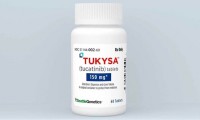-
New screening model shown to predict ten year breast cancer mortality risk
- Source: drugdu
- 106
- September 5, 2023
-
With trial win, Seagen’s breast cancer drug Tukysa boosts Roche’s Kadcyla—and Pfizer’s $43B buyout
- Source: drugdu
- 150
- August 19, 2023
-
Seagen Touts Phase III Data for Breast Cancer Combo Therapy
- Source: drugdu
- 202
- August 18, 2023
-
Healthy Breast Fat may Protect Against Invasive Breast Cancer
- Source: drugdu
- 104
- July 18, 2023
-
Dana-Farber research supports FDA approval of new therapy for metastatic breast cancer
- Source: drugdu
- 150
- June 6, 2023
-
Research finds alternating estrogen and anti-estrogen therapies effective in treating metastatic breast cancer
- Source: drugdu
- 125
- May 17, 2023
-
Dietary supplement helps combat resistance in breast cancer, finds study
- Source: drugdu
- 140
- April 12, 2023
-
All hormonal contraceptives ‘carry small increased risk of breast cancer’
- Source: drugdu
- 121
- March 22, 2023
-
Upcoming breast cancer drugs get a new target in milk production enzyme
- Source: drugdu
- 854
- September 13, 2018
-
Novartis’s Alpelisib Treats Advanced Breast Cancer
- Source: Reuters
- 890
- August 24, 2018
your submission has already been received.
OK
Subscribe
Please enter a valid Email address!
Submit
The most relevant industry news & insight will be sent to you every two weeks.













